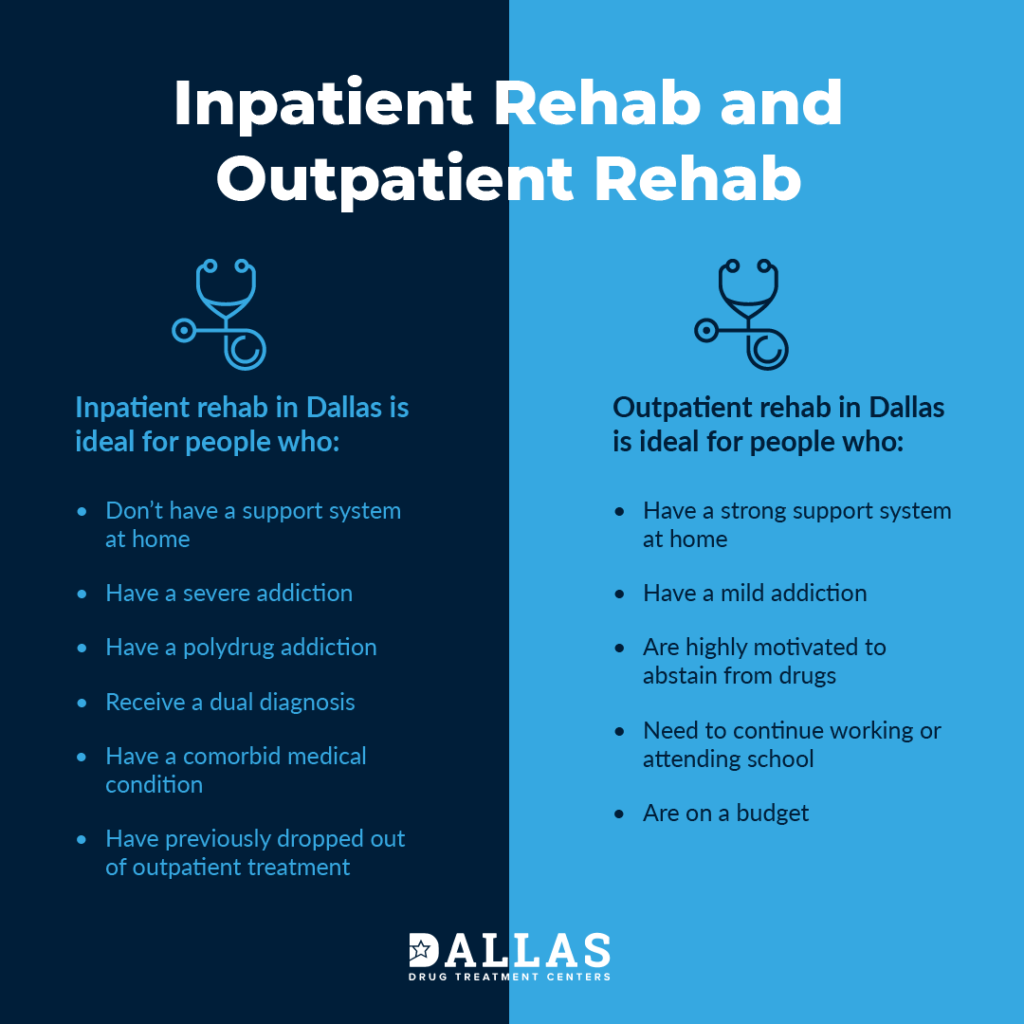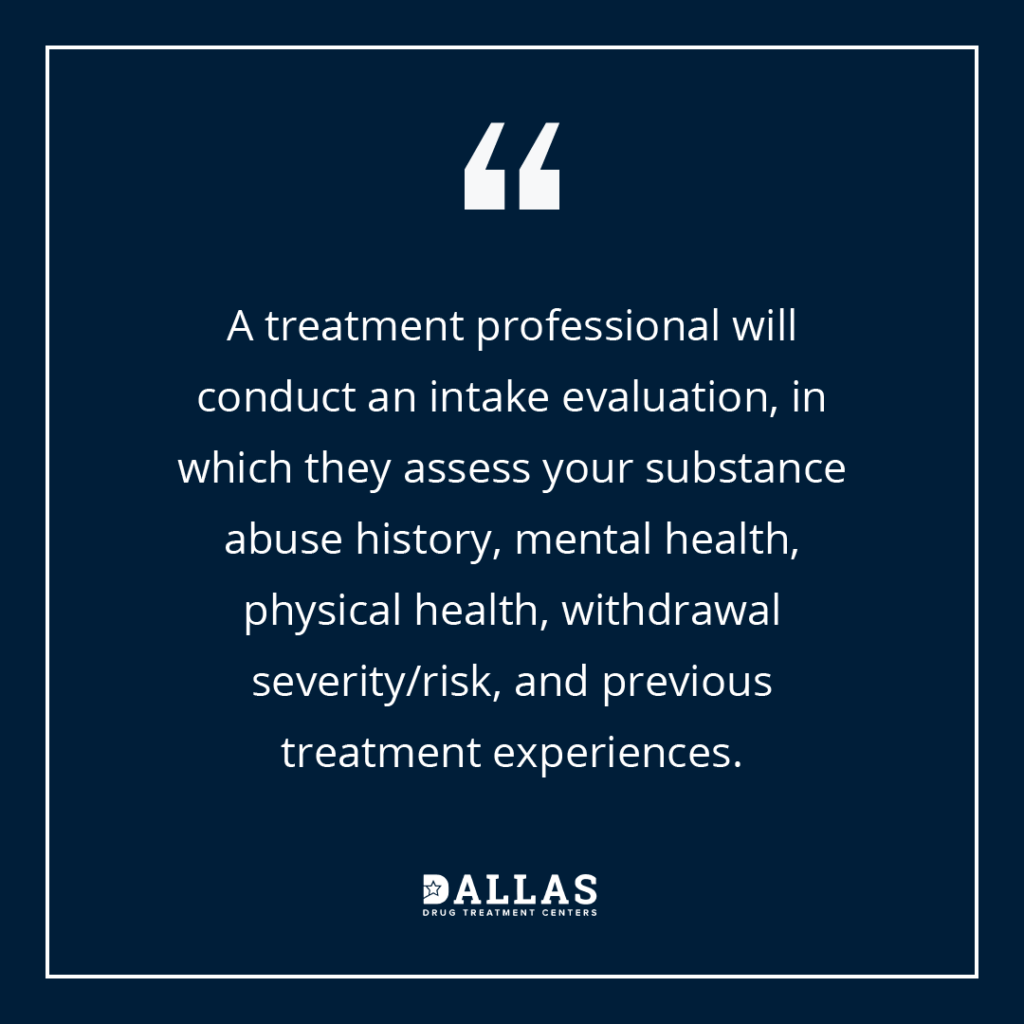Drug Rehab Treatment Settings: Inpatient vs. Outpatient

Texas is the second-largest state by area and population, with 28,995,881 people living throughout the state.1 Even with such a large population, every person can receive the necessary care and addiction treatment at a drug rehab in or near Dallas.
Drug use and misuse are serious threats throughout Texas. Methamphetamine is the most misused drug in the state.2
In 2018 alone, 951 Texas residents died of a methamphetamine overdose, 684 died of a heroin overdose, and 886 died from a cocaine overdose.2 However, the number of people seeking treatment is much higher. Thousands of people with substance use disorders seek help from doctors, support groups, therapy, and drug rehab centers in Dallas.
When you choose to join a drug rehab facility in Dallas, you can make a positive change in your life as you move toward sobriety. Some of the top benefits of joining a Dallas or North Texas rehab program are:
- Receiving personalized treatment plans for overcoming addiction
- Access to continual support and help
- Identifying underlying issues and addressing concerns to support change
- Building a healthy and productive lifestyle
Two ways to receive life-saving care and treatment for substance use disorders are through inpatient and outpatient drug rehabs.
Each treatment program has benefits suited for specific needs and lifestyles. Choosing the right program is a personal decision you should make after considering the advantages and disadvantages of each option and consulting treatment specialists for their professional recommendations.4
Inpatient Rehab in Dallas
Inpatient rehab is the most intensive program type and is ideal for more severe cases of drug addiction. It is an immersive experience where you stay in a facility, free from drug-using triggers and stressors.
With an inpatient treatment plan, you can achieve sobriety in 30-90 days through short-term programs or 6-12 months in long-term programs. An inpatient Dallas rehab includes structured treatment regimens and strict schedules. Throughout your stay at an inpatient facility, you receive around-the-clock care and treatment. However, one disadvantage is that inpatient treatment programs tend to cost more than outpatient programs, and you’ll also have to stop working, attending school, and helping with household responsibilities while you are away at rehab. That said, nothing is more important than your health and recovery, and many people find that receiving treatment in a distraction-free environment is very conducive to healing.
Inpatient rehab in Dallas is ideal for people who:
- Don’t have a support system at home
- Have a severe addiction
- Have a polydrug addiction
- Receive a dual diagnosis
- Have a comorbid medical condition
- Have previously dropped out of outpatient treatment
Outpatient Rehab in Dallas
Outpatient rehab has more flexibility and is ideal if you have obligations you can’t put on hold during treatment, such as work, school, or childcare. It is also a more affordable option since you aren’t staying at the treatment facility.
In an outpatient treatment program, patients attend daily sessions, treatment plans, and activities at the facility. Outpatient rehab lasts longer than inpatient rehab, because the treatment is spread out across several months as opposed to the immersive, full-time experience of inpatient programs. In most cases, outpatient treatment can take from three months to over a year. The hourly commitment ranges from a couple hours per week to several hours per day, depending on the level of care.
However, it’s important to note that outpatient rehab tends to have a lower success rate unless you are very motivated to remain substance-free. Since you are still immersed in your everyday environment, which may include triggers, you may be tempted to relapse. Thankfully, support is still available even in outpatient rehab – so those who are determined to undergo treatment can contact help and accountability partners when they struggle at home.
Outpatient rehab is ideal for people who:
- Have a strong support system at home
- Have a mild addiction
- Are highly motivated to abstain from drugs
- Need to continue working or attending school
- Are on a budget
What to Expect at a Dallas Drug Rehab Program
Generally, inpatient treatment programs offer more options and forms of support than outpatient programs. However, some parts of the programs are similar. Here is what to expect when entering either program.
How to Prepare for Drug Rehab
Before starting a treatment plan, you should make any necessary arrangements in your regular life to focus on treatment. These include:
- Taking the necessary time off from work
- Asking a friend or family to look after your home (for inpatient)
- Finding a method of transportation to the facility (for outpatient)
- Purchasing any necessary supplies for your inpatient stay
- Informing a group of supportive friends and family of your treatment plan
A strong support system is essential for both inpatient and outpatient programs. Your friends or family members can look after your home and help with responsibilities while you focus on treatment, and they can also support you during your aftercare to help you stay sober in the long-term.
What to Expect During Treatment

When you first arrive at a Dallas drug rehab center, you’ll go through the check-in process. This process includes an item search. Then you will be shown your room, where you can unpack and unwind.
After check-in, you will receive an intake evaluation, in which a treatment professional will assess your:
- Substance abuse history
- Mental health
- Physical health
- Withdrawal severity/risk
- Previous treatment experiences
If needed, you may undergo a medical detox before beginning your treatment plan begins. Detox sessions are usually completed in an inpatient treatment program, though some outpatient detox options are also available. Inpatient detoxes are more effective, as a medical team can monitor you during drug withdrawal and keep you safe.
After detox, your will begin your drug addiction treatment program, which includes an individualized treatment plan tailored to suit your needs. Examples of treatment modalities that may be included in your treatment plan include:
- Individual therapy, like cognitive-behavioral therapy or dialectical behavioral therapy
- Drug educational services
- Group counseling
- Family therapy
- Relapse prevention classes
- Addiction treatment medications, such as for opioid addiction recovery
You may also receive help for other psychiatric disorders if you attend a facility that treats dual diagnosis cases. About 88% of facilities treat clients with multiple mental and substance use disorders.5
Throughout your program, the treatment team will perform an ongoing assessment of your recovery progress and they will adjust your plan if a particular intervention doesn’t seem to be working. In this way, your treatment plan is an ever evolving and collaborative strategy.
Once you reach the end of your Dallas drug rehab program, your treatment team will create an aftercare plan that includes relapse prevention strategies and ongoing support designed to help you stay sober in the long run.
Drug Rehab Aftercare
Aftercare includes any type of care or program designed to help you on the road toward long-term addiction recovery. These programs guide you in your new, abstinent lifestyle. They also offer a support system that understands your struggles and can offer solutions and encouragement to overcome them.
Some standard aftercare programs available in Dallas, Texas include:
- 12-step programs, such as Narcotics Anonymous (NA)
- SMART Recovery meetings
- Step-down treatment in the form of an outpatient program
- Sober living homes
- Group counseling
- Individual therapy
- Connecting with a sponsor
Choose a program that matches your needs, time, finances, and lifestyle and will support you in your journey through recovery. You may also want to consider using a combination of options, as each offers different support.
Find a Drug Rehab in North Texas
Once you’ve made the courageous decision to attend drug rehab, finding the right program should be easy. Call our helpline at 1-(214) 935-2287 to speak to a recovery support specialist who can help you find a drug rehab in North Texas or elsewhere.
You can join the thousands of others in Dallas and North Texas who have found happiness, health, and a new life through treatment in some of the best drug rehab programs in Dallas.
Resources
- United States Census Bureau. (2019). QuickFacts Texas.
- Maxwell, J.C. Ph.D. (2019). State of Texas Drug Use Patterns and Trends, 2019.The University of Texas at Austin, Steve Hicks School of Social Work.
- National Institute on Drug Abuse. (2020). Texas: Opioid-Involved Deaths and Related Harms.
- National Institute on Drug Abuse. (2018). Principles of Drug Addiction Treatment: A Research-Based Guide (Third Edition).
- Department of Health and Human Services. (2020). National Survey of Substance Abuse Treatment Services (N-SSATS): 2020.
